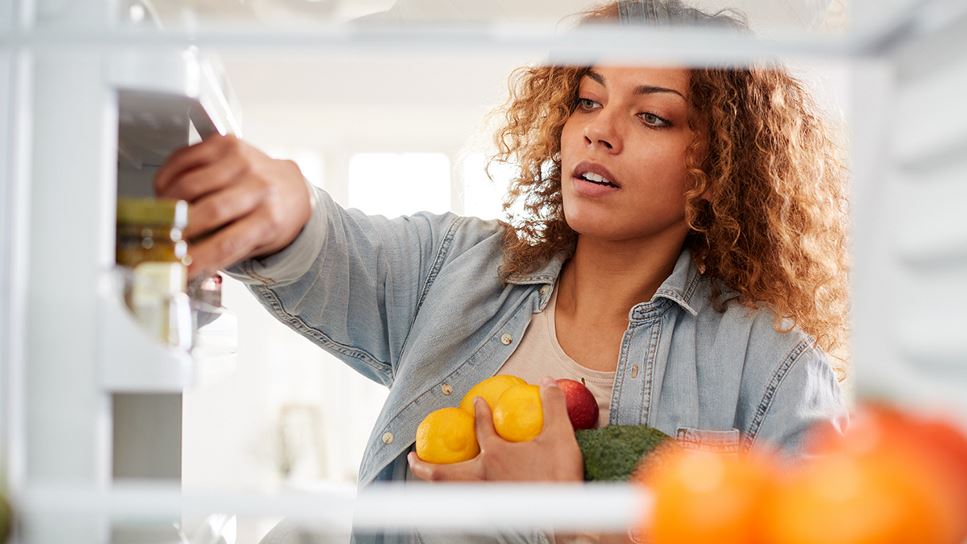When stored properly, foods remain safe and retain their quality, nutrients and flavor for longer. Be sure to store food in the right container for its size and storage space, at the right temperature and for the right length of time. Proper food storage will reduce your risk of food poisoning and help stretch your food dollar since your food won't spoil as quickly.
It is easy for food to get lost in the vast expanse of your refrigerator. To keep perishable food safe and out of the danger zone, you must wrap and store it properly for the appropriate amount of time.
In the Fridge
From meats to cheeses and leftovers, use these tips to ensure you are storing foods safely in the refrigerator.
- Keep your refrigerator below 40°F. At this temperature, bacteria that spoil food grow slowly. Buy a refrigerator thermometer and keep it in your fridge. Also, make sure you don’t keep the refrigerator door open for too long when searching for snacks and ingredients or restocking groceries.
- Leave food in its store wrapping unless the package is open and doesn’t reseal. If you have to re-wrap, seal storage containers well to prevent moisture loss and absorption of odors.
- Store food quickly. Don't keep perishable food at room temperature for longer than two hours.
- Avoid overloading your refrigerator because cold air needs room to circulate.
- Once a week, clean out the refrigerator. Discard any questionable foods rather than risk food poisoning. When in doubt — throw it out!
- If food is moldy, discard it in a bag or wrapper so mold spores don't spread. Clean the moldy food's container and the refrigerator or pantry to remove mold spores. Check items that the moldy food may have touched because mold spreads fast on fruits and vegetables.
Meat, Poultry and Fish
- Keep packages of raw meat, poultry and fish in a separate plastic bag, bowl or pan on the lowest refrigerator shelf. This keeps juices from dripping onto other foods, and the lowest shelf is usually the coldest.
- Use fresh meat, poultry and fish within a couple days. Toss meat, poultry or fish with an off odor, a sticky or slimy surface or discoloration.
Eggs
- Eggs will stay fresher longer if you keep them in their carton, not in the egg tray or door shelf.
- Use fresh eggs in the shell within three to five weeks.
Fruits and Vegetables
- Refrigerate perishable fruits and vegetables such as berries, lettuce, mushrooms and herbs. Wait to wash fresh produce until just before using, and when it comes to washing produce, skip the soap and detergents as these foods can be absorbed by the food. Drying fresh produce with a paper towel after washing may also help remove additional bacteria.
- Keep produce in crisper bins in the refrigerator. That helps retain moisture. If possible, keep fruit in a separate crisper from vegetables because fruit gives off ethylene gas that can shorten storage life.
- While some produce can be stored at room temperature, like citrus, whole melons and potatoes; cut, peeled or cooked fruits and vegetables should always be refrigerated.
Fresh Dairy Products
- Refrigerate all dairy products promptly and preferably in the back of the refrigerator where it's colder. Cover well so they don't pick up other odors.
- Once milk is poured, never return it to its original container because it can be contaminated with outside organisms that cause spoilage and food poisoning.
Grains and Canned Foods
- If stored properly in airtight containers, whole-grain flour will keep for 3 to 6 months in a cool, dry pantry shelf or 6 to 8 months in the freezer.
- Once canned foods have been opened, transfer them to a clean, covered container before refrigerating. You can refrigerate opened canned foods in the can if covered, but flavor may be affected.
Leftovers
- Refrigerate promptly to ensure leftovers don't enter the danger zone between 40°F and 140°F.
- For large amounts of leftovers, store them in several small, shallow containers to cool faster.
- Carefully date leftovers and keep them at the front of the refrigerator where you can see them and use them right away.
- Discard all leftovers in the refrigerator after four days. Some leftovers can be stored in the freezer for later use.
- Remove as much air as possible from storage bags to keep foods fresh longer. The less you handle food, the better.
References
Find a Nutrition Expert
Looking for credible nutrition information and recommendations? The Academy of Nutrition and Dietetics' network of credentialed food and nutrition practitioners are ready to help!

